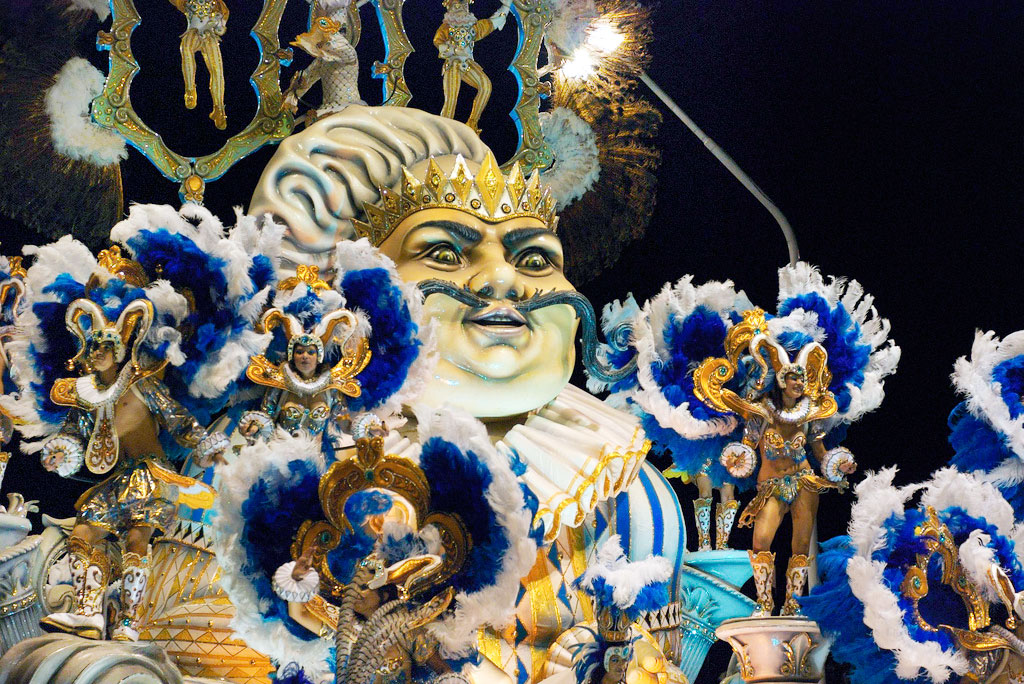
An elaborate Carnaval float. Photo © Kevin Jones, licensed Creative Commons Attribution.
Entre Ríos’s biggest party town, Gualeguaychú hosts Argentina’s top Carnaval celebration—not quite Rio, but worthwhile if you’re in Buenos Aires instead of Brazil. Dating from 1783, it has a smattering of colonial constructions, but it is most popular with Argentines for access to its namesake river. To the east, the Puente Internacional General Libertador San Martín offers the southernmost bridge access into Uruguay, to the city of Fray Bentos. In recent years, though, anger over a proposed pulp mill on the Uruguayan side has brought roadblock demonstrations by Argentine environmental activists and less savory opportunists.Gualeguaychú (pop. about 100,000) is 220 kilometers north of Buenos Aires via RN 14 and an eastbound lateral road that leads directly to the central Plaza San Martín, a square occupying four full blocks. To the east, the Río Gualeguaychú, a tributary of the larger Uruguay, meanders southward.
Dating from 1914, the city’s only national historical monument is the Teatro Gualeguaychú (Urquiza 705). It’s still the principal high-culture venue, with theater, music, and dance performances. At the northeast corner of Plaza San Martín, Gualeguaychú’s oldest construction (1800) is the Solar de los Haedo (San José 105, 9 a.m.–11:45 a.m. and 5–8 p.m. Wed.–Sat., 9 a.m.–11:45 a.m. Sun., free), which Italian patriot Giuseppe Garibaldi used as his headquarters during the Uruguayan struggle against Rosas.
José S. Álvarez, better known by his pen name Fray Mocho, resided at the Casa de Fray Mocho (Fray Mocho 135), which awaits restoration as a museum. Álvarez founded the early-20th-century satirical magazine Caras y Caretas, the counterpart of England’s Punch.
On the grounds of the former Estación Ferrocarril Urquiza (railroad station, Avenida Rocamora and Avenida Irazusta), the enclosed Corsódromo is the main site for the midsummer Carnaval parades. The station also contains the open-air Museo Ferroviario, with antique steam locomotives, dining cars, and other rolling stock.
The landmark Teatro Municipal (Urquiza 705, tel. 03446/42-7989) remains the principal performing arts locale.
Oriented toward visitors from Buenos Aires, Gualeguaychú’s Carnaval del País celebrations take place weekends in mid to late summer, depending on the Lenten calendar. If bad weather intervenes, though, the final weekend may even be pushed back in Lent. Admission to the Corsódromo costs around US$16 pp, with the best reserved seats an additional US$10 pp.
Information and ServicesGualeguaychú’s main Oficina de Información Turística Puerto (Tiscornia and Goldaracena, tel. 03446/42-3668) is on the riverfront Paseo del Puerto. At the bus station, it also has a convenient Oficina de Información Turística (Avenida Artigas and Bulevar Jurado, tel. 03446/44-0706). Both have helpful personnel, thorough information that includes accommodation details, and improved maps. Hours are 8 a.m.–10 p.m. daily in summer, 8 a.m.–8 p.m. the rest of the year.
For motorists, ACA is at Urquiza 1001 (tel. 03446/42-6088). Half a dozen banks along Avenida 25 de Mayo have ATMs, but there are no exchange houses.
Correo Argentino (Urquiza and Angel Elías) is the post office; the postal code is 2820. There are Telecentros at the bus terminal and at 25 de Mayo 562. Cibernet (25 de Mayo 874) has fast Internet access. For medical services, Hospital Centenario (25 de Mayo and Pasteur, tel. 03446/42-7831) is west of downtown.
Getting There and Around
Gualeguaychú’s shiny new Terminal de Ómnibus (Avenida Artigas and Bulevar Jurado, tel. 03446/44-0688) is at the southwest approach to town. Buses to Fray Bentos and other Uruguayan destinations are suspended until further notice because of the pulp mill controversy.
Otherwise, sample destinations, times, and fares include Buenos Aires (3 hours, US$11); Paraná (5 hours, US$12); and Córdoba (11 hours, US$40).
Excerpted from the Third Edition of Moon Argentina.